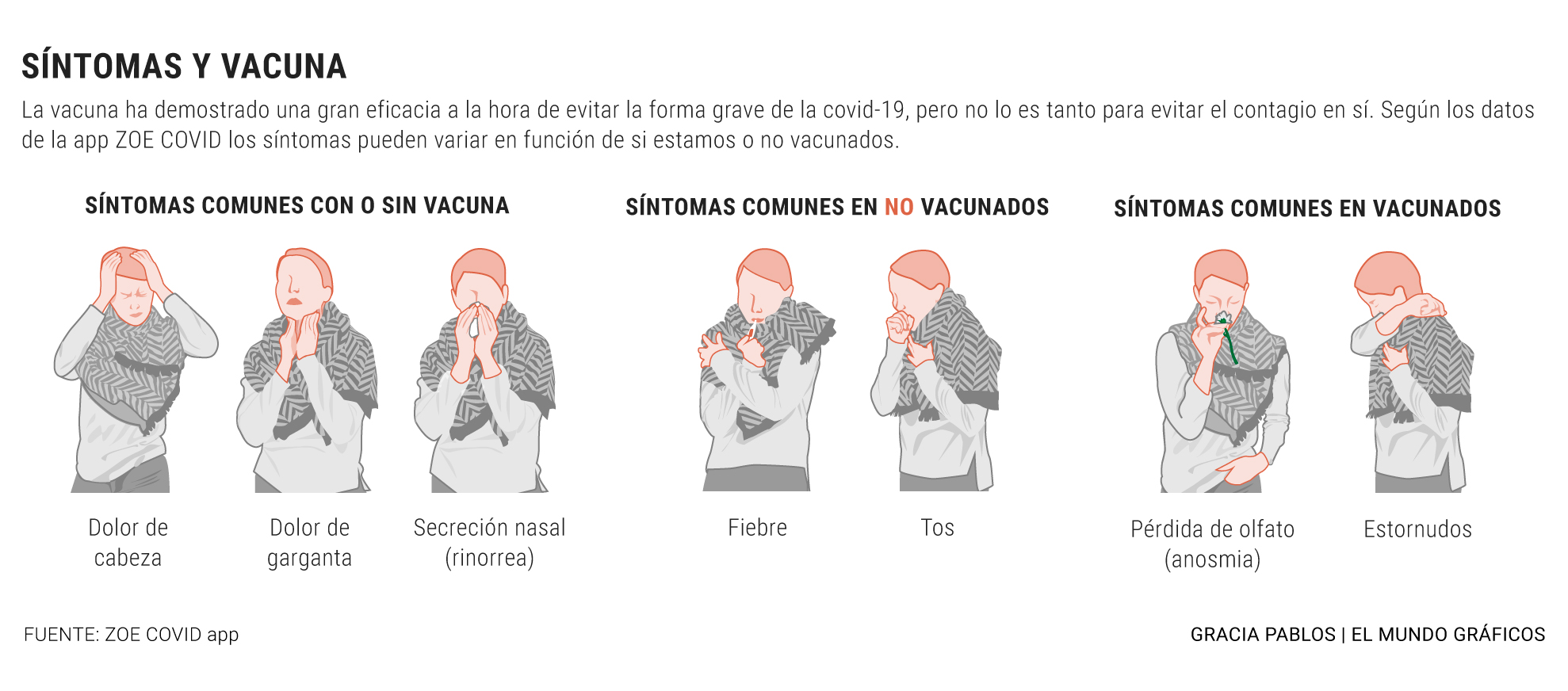GRACE PAUL
Updated Thursday, 25November2021-13: 56
Share on Facebook
Share on Twitter
Send by email
Comment
Direct Latest news about the coronavirus
Health Do colds that your children pass in a mild way 'knock you down'?
We explain why
Pandemic Flu and delta plus, the circulation of both viruses threatens the stability of winter
Nurse Saturated Covid or flu: the vaccination campaign and the third doses
During the first months of the pandemic, it was highly inadvisable to go to the doctor to find out
if the culprit of a persistent cough or a sudden fever was the so-called 'new coronavirus'.
We ran the risk of becoming infected if we were not already, and that is why we were encouraged to monitor our own symptoms while they were mild.
At that time, pharmacies did not sell antigen tests and we did not even know all the symptoms that COVID could hide behind.
But
there was a well-known 'triad'
, which was used to screen for probable cases:
cough + fever + shortness of breath
.
As the virus spread and more people became infected, the symptom picture grew, and the profiles became less specific.
In this context, the ZOE COVID Study app was born, part of a non-profit study promoted by the scientific company ZOE and led by epidemiologist Tim Spector.
This app
is dedicated to collecting data on symptoms and the way in which the disease occurs in its more than four million users
.
Thanks to it, health authorities were alerted about some of the symptoms that frequently appeared among those who were positive for COVID, such as confusion or delirium among hospitalized elderly patients.
The data from this application not only
allows us to find out that sneezing may not be as far from covid as we first believed
, it also establishes frequent and, most importantly, dangerous combinations in cases of covid.
The passage of time has not only allowed us to know the virus better and add symptoms to that list
, it has also brought us the vaccine to combat it.
Ironically, both have contributed to further blur his profile and make it more difficult to differentiate covid from other common illnesses, such as the flu, the common cold or seasonal allergy.
Experts also warn that
this winter there are more people vulnerable to these diseases
, since in previous months we have not been so exposed to viruses thanks to anti-covid measures.
That implies that perhaps this year the flu or the cold will be somewhat stronger, and with the covid in full circulation we will have to learn to distinguish them (although we can have the flu and covid at the same time, for example).
There are many shared symptoms, although
nuances must
also
be taken into account, such as those found in the test shown at the beginning
.
In the case of fever, for example, it is not the same to have a few tenths (something that could happen in a cold) than to have a high temperature, close to 38ºC.
This is more typical of the flu ... and the covid.
Cough, another of the most well-known symptoms, tends to be persistent and dry in both flu and covid
, nothing to do with the
productive
cough or with the usual mucus in a cold.
On the other hand, runny nose (rhinorrhea) is not as uncommon as was initially believed, although if it appears alone and in the midst of a low incidence of covid, it is more likely to be an allergy or a cold.
Among the more specific or characteristic symptoms are
anosmia (loss of smell) and skin
changes such as discoloration of the fingers or toes or skin rashes.
Neither are common symptoms in other respiratory diseases.
There is
another element that makes it more difficult to distinguish the symptoms of both diseases: the vaccine.
Any of the authorized ones has been shown to be highly effective against the most serious form of coronavirus disease, but they are not as effective when it comes to preventing contagion, especially if we talk about the new variants.
However, the fact that we pass the disease in a milder way has also interfered with the picture of symptoms and
the data from the ZOE COVID app indicate that the vaccinated and the non-vaccinated do not always share the same
symptoms
.
The only way to know with sufficient certainty if we are infected or not is through a PCR
, not even the antigen test completely clears the doubt, so in case of doubt the advice is always the same: take care of yourself and those who care for you. surround, stay home if you feel sick, and monitor your symptoms for any that might require medical attention.
And of course, consult your doctor for any questions or the possibility of performing a PCR.
According to the criteria of The Trust Project
Know more
Science and Health
Covid 19
Coronavirus
Infectious diseases
Flu
HBPR
Health Do colds that your children pass in a mild way 'knock you down'?
We explain why
Flu and delta plus, the circulation of both viruses threatens the stability of winter
The contagion rate R warns us of another possible wave
See links of interest
The Palm
Last News
What
2022 business calendar
Christmas Lottery 2021
Search Christmas lottery number
Covid passport
Holidays 2021
Loteria del Niño 2022
How to claim insurance damages
Black friday
Bayer 04 Leverkusen - Celtic
Crvena Zvezda - Ludogorets Razgrad
Dinamo Zagreb - KRC Genk
FC Midtjylland - Sporting Braga
Galatasaray - Marseille

